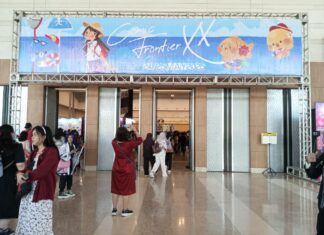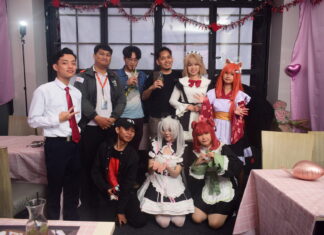These days we can just open our gadget to be connected to the world and get various information through the Internet. As one of the communities that constantly use digital information in their daily life, the interaction between otaku and digital media information could be a unique subject for research because their information behavior is different from task-oriented information behavior.
Information behavior, referring to Wilson’s definition, is the totality of human behavior about sources and channels of information, including both active and passive information seeking, and information use. Thus, it includes face-to-face communication with others, as well as the passive reception of information as in, for example, watching TV advertisements, without any intention to act on the information given [1].
Information, summarized from various definitions of it, is processed data that will give a certain meaning for its user. It could be used for decision making or problem-solving. As an essential skill in our information society right now and a basic skill of life-long learning, information literacy skills models have been developed since the 20th century to the extent that they can be compatible for our digital era too. One of them is Digital Information Fluency (DIF) model, defined as the ability to find, evaluate and use digital information effectively, efficiently and ethically. DIF involves knowing how digital information is different from print information; having the skills to use specialized tools for finding digital information, and developing the dispositions needed in the digital information environment [2].
A survey on Indonesian otaku‘s information behaviour has been held for five days from September 1 until 5, 2019. The data are collected through Google Form shared through KAORI Nusantara social media. This survey uses Digital Information Fluency model as an indicator of information behavior and uses random sampling from KAORI Nusantara social media followers. 154 respondents participated in this surve,. DIF competencies are formed by five questions that will lead users to be able to use information literacy skills.
What am I looking for?
This question is the Phase 1 of the search phase, where users have to identify key concepts in a research question, and create effective and efficient search queries. Indonesian otaku have understood about the key concept of the information they want to search based on what kind of information they usually search. From 154 respondents, the topic they usually search are:
- Anime 96,1% (148)
- Manga 67,5% (104)
- J-pop 44,8% (69)
- Reviews and recommendations 43,5% (67)
- J-cultural events 34,4% (53)
- Light novel 28,6% (44)
- Merchandise 26,6% (41)
- Visual novel 23,4% (36)
- Indonesian creative industry 22,1% (34)
- Others; such as Indonesian railway, voice actors, tokusatsu, game, and TV series 23,3% (36)
As for languages in query; 53,2% (82) of them use English as their searching language, 39% (60) use Indonesian, and 7,8% (12) use Japanese. This result shows that Indonesian otaku can translate their natural language (Indonesian) or natural language (Japanese) of works such as anime or manga title into another language (English) in a query. English becomes a solution to the language barrier in searching for information about Japanese works.
Where will I find the information?
Phase 2 of searching is where users have to understand the organization of digital information and select digital collections effectively and efficiently. The result of, “where will you find information?” shows that most of the respondents find information from group discussions and forums. Those places usually contain information about popular phenomenon and seasonal information, it’s a place to share their similar interest of something.
- Group discussions and forums 50% (77)
- News sites 27,3% (42)
- Official websites and official accounts 22,7% (35)
How will I get there?
Phase 3 of searching is where users have to select digital tools and search strategies to find reliable information. This result shows how the respondents access their information. At this point, Indonesian otaku has understood the where-to and how-to of accessing information effectively using digital tools and data collections.
- Search engine 41,6% (63)
- Group discussions and forums 32,5% (50)
- Official websites and official accounts 18,8% (29)
- Database and directory 7,1% (11)
Refering to where they can gain information, the result shows that respondents gain information from group discussion. It means that their interaction with information is brought by communication between humans and not by human-machine interaction. Although communication between humans may also involve machines such as social media algorithm, in this context social media is used as a vessel for sharing information. Human-machine interaction refers to human actively using indexing machine (such as search engine or directory) to gather the information they needed. We know that a hyped topic can appear on someone’s timeline by social media algorithm when a post becomes popular if it has a lot of feedback. This could lead us to conclude that information behavior of otaku are not needs-oriented, but just because they find information through their social media timeline or forum.
The result of whether they use information searching strategies or not is almost balanced, with 47,4% (73) answering yes and 52,6% (81) answering no. In information strategy, 80 respondents mentioned the most used information searching strategy is fuzzy search and natural language query to access information. Considering the language barrier and their references for the information they want to know, the search results could be enough for otaku because the information they search is not for academic or research purpose. This also proves that otaku can understand the context brought by search engine be it in different languages or different terms and find it reliable to them.
- Fuzzy search 71,3% (57)
- Natural language query 60% (48)
- Term masking 41,3% (33)
- Boolean logic 23,8% (19)
- Contiguous word 21,3% (17)
- Thesaurus 11,3% (9)
How good is the information?
By this, we led the respondents to evaluate their search results. Respondents are asked whether they change their keywords and search again if the search results are not the information they needed. The results are:
- Yes 71,4% (110)
- Maybe 27,3% (42)
- No 1,3% (2)
Indonesian otaku can determine whether search results are reliable or not and insert another query for more relevant information. We also asked them the probability of finding information in their natural language. So search engine results do not always show the information they needed, and they need further research about it.
- Yes 48,1% (74)
- Maybe 41,6% (64)
- No 10,4% (16)
We have this as a bonus question about their impression of Indonesian anime news portals.
- Excellent 5,2% (8)
- Good 51,9% (80)
- Enough 31,8 (49)
- Poor 11% (17)
How will I ethically use the information?
At this point, we have to ask users about what they do with the information they get.
- Saving information 42,8% (66)
- Information sharing dan discussion 30,5% (47)
- Further search dan crosscheck 14,9% (23)
- For decision making 9,7% (15)
From this result, we know that the information they get usually just stored in their frame of reference. Another response is the information they get is used for information sharing, and furthermore, used to deliver a topic for discussion. We can imagine that this interaction between community and information could be a life cycle. They get information from the forums, and the forums get information from them. Some respondents also use the information as a reference for further research and they use the information to consider whether or not they are going to watch anime and other works.
It could be said that their reason to search for information is purely because of curiosity. Indonesian otaku information behavior is not task-oriented behavior where information is required to solve a problem since their need is entertainment. Indonesian otaku use information to open interaction between community or individuals. As a matter of entertainment, information about J-pop media and culture aren’t used for academic studies but market studies.
We also asked their contribution to information sources. Most of them agree to contribute to the page of information sources by giving some feedback such as like, comment, share, and subscribe. But there are also respondents who don’t give any contribution to their information resources.
- Feedback (like, comment, share, subscribe) 57,7% (89)
- Turn off AdBlock 3,8% (6)
- Become participant at their content 4,5% (7)
By contribution, the respondent asked whether they share information with a comment or not. The results are:
- Yes 24%% (37)
- Maybe 55,2% (85)
- No 20,8% (32)
Last, the respondents are asked if they are share information with citing the source or not. As expected they share information citing the source, although there are respondents who don’t.
- Yes 92,9% (143)
- No 7,1% (11)
This brief profile shows that Indonesian otaku are confident in searching for information from group discussions and forums. They’d rather get information from human interaction through social media than human-machine interaction. Indonesian otaku can be considered to have passive information behavior because they get information more from forums and group discussions than the official account. But also because of their passive information behavior, their information searching behavior is purely out of curiosity and the information they get could affect their decision making. By getting informed from groups dan discussions, Indonesian otaku may provide open-mindnesess not only while searching various information with various tools, but also while discussing things with their community.
Indonesian otaku information behavior needs to be further researched to understand the phenomenon between otaku and their information behavior, how they interact in their community by bringing information as a topic of discussion, and how they share thoughts and defined that as information in their frame of reference.
References
[1] Wilson, T. D. (2000) Human Information Behavior. Special Issue on Information Science Research, 49-55.
[2] https://21cif.com/resources/diforce/index.php
The Indonesian Anime Times | KAORI Research Team
















[…] How Do Indonesian Otaku Search and Use Information? A Brief Profile of Indonesian Otaku Information … (The Indonesian Anime Times, Vina Nurziani) […]